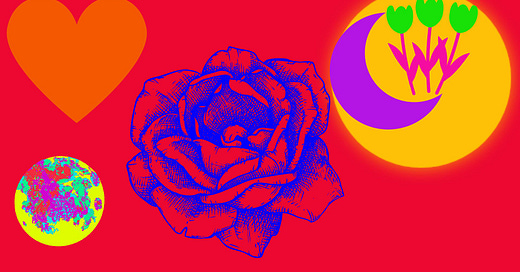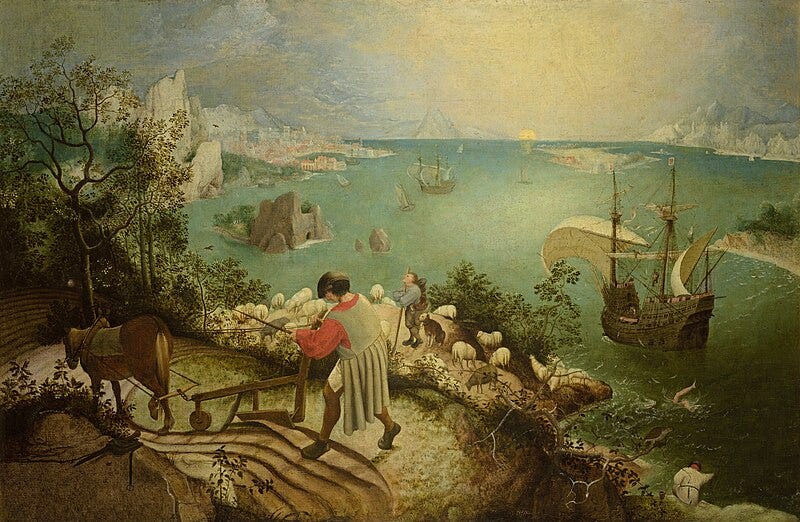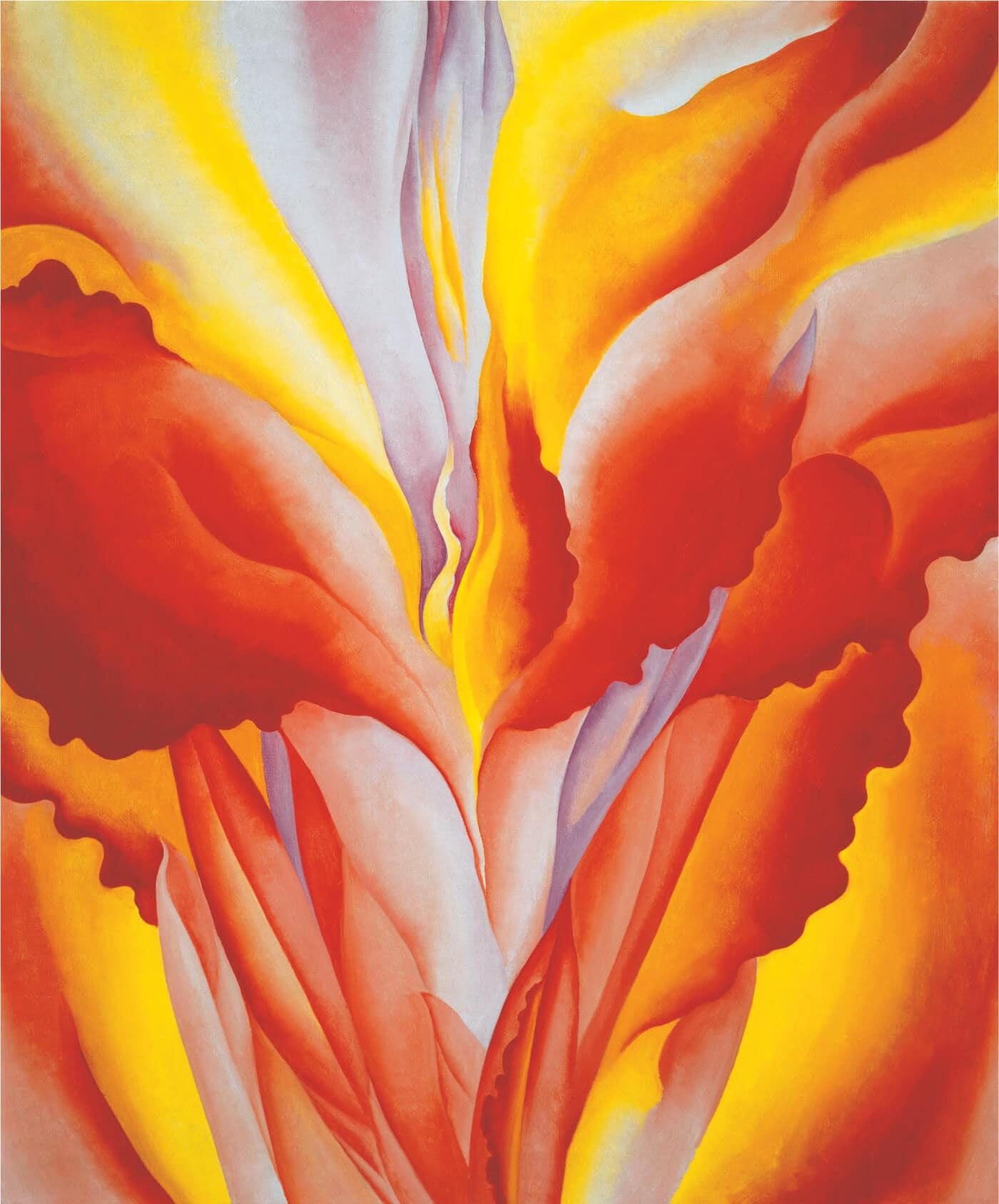This short talk was given at the “Poetry Symposium” at the Queens Museum of Art on 12/8/24, as part of a panel on ekphrasis. The entire symposium was organized by Tiffany Troy, who never ceases to amaze me with her boundless energy and brilliance.
Writing in the Museum
I.
I am going to start off by reading a poem to you today, called “Why I am not a painter” by Frank O’Hara:
I am not a painter, I am a poet.
Why? I think I would rather be
a painter, but I am not. Well,
for instance, Mike Goldberg
is starting a painting. I drop in.
“Sit down and have a drink” he
says. I drink; we drink. I look
up. “You have SARDINES in it.”
“Yes, it needed something there.”
“Oh.” I go and the days go by
and I drop in again. The painting
is going on, and I go, and the days
go by. I drop in. The painting is
finished. “Where’s SARDINES?”
All that’s left is just
letters, “It was too much,” Mike says.
But me? One day I am thinking of
a color: orange. I write a line
about orange. Pretty soon it is a
whole page of words, not lines.
Then another page. There should be
so much more, not of orange, of
words, of how terrible orange is
and life. Days go by. It is even in
prose, I am a real poet. My poem
is finished and I haven’t mentioned
orange yet. It’s twelve poems, I call
it ORANGES. And one day in a gallery
I see Mike’s painting, called SARDINES.
The theme of many of the panels today will be “Writing in the Museum,” or more so, since most or all of us are primarily poets here, the idea of the ekphrastic act will be front and center in much of what is said.
If you don’t know what the word ekphrasis means, it is the gesture of writing a poem about a piece of visual art, particularly a painting.
The Frank O’Hara poem I just read you is in many ways an ekphrastic poem. It is about a piece of visual art, made by Mike Goldberg, called “SARDINES.” The space that the poem resides in and gets its inspiration from is not a museum, but more so, a private place where a painter paints: likely an art studio.
And yet the poem is a perfect way to think about the idea of writing in a museum.
Frank O’Hara lived from 1926-1966. He was only 40 years old when he died. All of the fabulous poems we know him for were written by then. Isn’t that astounding!
And during those years he also famously worked in the MoMA from 1951-1953 and then from 1955 until his death, as both a staff member and then, a curator, and so was surrounded by all of the artwork there.
It’s hard not to imagine that all of Frank O’Hara’s poems were in many ways ekphrastic.
But I am not here today to talk about Frank O’Hara’s life, although I will talk about his poem, “Why I Am Not A Painter.”
I might ask you, what interests you about it? One thing that interests me is that the title of it sets up the idea of something the persona is not. He is not a painter. He is a poet.
The persona is a poet and becomes one in the act of writing poems within this poem, but then of course Frank O’Hara is writing this poem that we are reading and that is what makes him a poet.
He is writing a poem about a painting, but this poem is not a painting, or so it seems.
What has always interested me about writing in museums is communication and also, what is absent there.
What is absent in O’Hara’s poem is that he is not a painter.
What is also absent are the sardines. We learn in the poem of the sardines that were in there that the painter painted over, but then commemorated them in the title.
Somehow the poem is also about the color orange. The 12 poems the persona writes are called “Oranges” even though they aren’t mentioned at all and are simply the thought that inspired the poem.
If writing an ekphrastic poem is about writing what art inspires but is not exactly there then Frank O’Hara’s poem does exactly that.
If the connection between a painting and a poem is the idea or ideas that haunt both then that is what makes writing in museums very special.
II.
When I think of ekphrastic poetry and writing in museums I think too of W.H. Auden’s “Musée des Beaux Arts,” which I will now read:
About suffering they were never wrong,
The Old Masters: how well they understood
Its human position; how it takes place
While someone else is eating or opening a window or just walking dully along
How, when the aged are reverently, passionately waiting
For the miraculous birth, there always must be
Children who did not specially want it to happen, skating
On a pond at the edge of the wood:
They never forgot
That even the dreadful martyrdom must run its course
Anyhow in a corner, some untidy spot
Where the dogs go on with their doggy life and the torturer's horse
Scratches its innocent behind on a tree.
In Brueghel's Icarus, for instance: how everything turns away
Quite leisurely from the disaster; the ploughman may
Have heard the splash, the forsaken cry,
But for him it was not an important failure; the sun shone
As it had to on the white legs disappearing into the green
Water; and the expensive delicate ship that must have seen
Something amazing, a boy falling out of the sky,
Had somewhere to get to and sailed calmly on.
In this poem, Auden plainly narrates how disaffected most humans are to the suffering of others. He narrates this through his poem, the painting, “Landscape with the Fall of Icarus,” by Pieter Bruegel the Elder.
“Landscape with the Fall of Icarus,” Pieter Bruegel the Elder, 1560.
In the painting, we can see the fallen Icarus who famously did not heed the words of his father, who told him to keep an easy course not too close to the burning sun and not too close to the pull of the sea. Instead young Icarus thought he knew better like the young often do. He flew too close to the sun with his waxen wings and then drowned.
In the painting, we see legs, disembodied, simply splashing as the people of the town go about their day. They are Icarus’s legs of course and the splashing, his last living movements.
In Auden’s poem we too hear of the “white legs disappearing into the green/ Water.” We hear of the callous “expensive delicate ship that must have seen/ Something amazing, a boy falling out of the sky,/ Had somewhere to get to and sailed calmly on.”
Is that such a truth that Auden wrote of, inspired by the ekphrastic conversation that Bruegel the Elder’s painting has made within him? That aren’t we all just going somewhere anyway, calmly sailing on past most suffering.
I’ve always felt myself most like Icarus, not so great at heeding moderation. But also too aware that when I drowned there would be no one to save me.
Eventually I learned to not want to be saved at all.
What about you? Are you waiting to be saved?
In Bruegel’s painting, we can see the water splashing in white and green brushstrokes. In Auden’s poem, we can hear the splash of Icarus, with not a bang but a whimper, and the sound of the soft bottom of the boat, gliding calmly by.
That’s the essence of Writing in a Museum. A painting’s actions can turn into verse. Something of real life can extend into the space between the two forms.
In Auden’s use of ekphrasis, we can come up to the face of human indifference.
And possibly only the holy conversation between poem and painting allows us to do so.
III.
But when I really think of writing in museums, I think of the Red Canna Exercise that I often do with my students. Some people here have likely done this exercise with me.
To start, we read Bhanu Kapil’s “What are the consequences of silence?” from her 2001 book, A Vertical Interrogation of Strangers, so I will start off by reading that to you now:
53.
Red Canna, I see you. Edge of. What I saw: a flower blossoming, in slow motion.
Not specific enough. Okay. No. Cannot. Red Canna, I veer into you. I
am not in
one straight line. Red Canna, I see you. 1904. The University of Arizona
Museum
of Art. Opening in slow motion: are you okay? Are you okay? Can you
hear me?
(I can't)
That's how it begins: impenetrable.
The book of two words I happen to see, out of the corner of my eye, on
a wall. Such
slowness.
These words took years to arrive.
If you hadn’t guessed it already, the poem itself could be considered (although it’s not only that) an ekphrastic poem for Georgia O’Keefe’s “Red Canna,” which is the image you have seen in front of you this whole time.
Red Canna, Georgia O’Keeffe, 1925-1928.
Kapil makes the poem ekphrastic by mentioning the place where the painting hangs, The University of Arizona Museum of Art. We might imagine her or the persona going there and writing this poem.
When I bring this poem into the classroom for a writing exercise, we first discuss: What are the book of two words Kapil’s persona mentions?
Are they the wall text that might say Georgia O’Keefe’s name or “Red Canna” itself? Are the two words “I can’t” and who is saying them. Who cannot speak or hear here?
We think then about who exactly has been talking in the poem. The painting Red Canna that is referenced in the poem or Georgia O’Keefe herself? A fragment of Kapil’s poetic voice which only speaks within the poem. Or another voice of the past that she is summoning?
Or perhaps is the thing saying “I can’t,” I cannot speak, the flower Red Canna herself who lived for just a day and yet inspired O’Keefe to make this painting? And now the flower lives for 100 years or more as we look at her. Her fleeting flower beauty caught in something more than immortality.
We might even consider: How is Bhanu Kapil’s poem a potentially occult conversation? As in, not necessarily magical or supernatural, but hidden. The idea of occult as some phenomena in which the signs are not obvious.
Is who is speaking here in this poem, a painting, a painter, a flower, or something else? It is occult because we have yet to find out what it is, and so it is an eternal mystery.
And if the poem and the painting here are in an occult conversation, with what is it in conversation with?
Maybe this painting, to reference Elizabeth Metzger’s talk later, is a portal to another world, where the Red Canna lives forever but cannot speak to us so easily. The flower says “I can’t hear you,” but that’s more because we cannot hear her either.
Because maybe the book of two words are instead, “Such/ slowness.” That to speak across the vast chasm between painting and poem takes quite a long time.
What are the consequences of silence, after all.
In class, after talking about all of this, we usually write a love poem to a flower. The title of our new poem is a burning question we have about eternity.
IV.
This whole time I haven’t discussed at all all of the special things that can happen when writing in a museum. Not the green sponge or the air conditioned space. The time with people you really like. The expansively rich walls that are everchanging to fit an artist’s or a curator’s whim. The very regal stately feeling of writing there. The lunch with iced tea after.
And not the strange looks one gets sitting there scribbling when you should be looking briefly at the work and moving on.
I haven’t said a thing, albeit explicitly, about how writing in museums makes you look at art more closely and that most people, even those who love art (maybe especially them?) never really look at art at all.
There will be time for such things to say. But maybe the act of it and its gift can only be the Sardines of this exchange.
Anyway, I urge you to go to your local museum and write poems.
Write 12 of them.
When you’re done, call the whole thing: ORANGES.







Wow. Thank you for the talk and the embedded prompt. I immediately wrote a poem that I think I love. I'm calling it, "To a Black-Eyed Susan who Refused the Sun." And I love to write ekphrastic poems, but this one wasn't one of them. So much inspiration - from Icarus to Oranges.
RUBENS
Fleshly fanfare, this; though
No trumpets sound, still sway
Painted skirts, circling, spinning.
Cherubs a gallery wall away
Smile. If flesh be grass, then
How verdant these canvas fields!
Luxuriant, the human blades
Undulate. Each sensuously yields
To the wind of song, and
Raw unseen rhythms. No sweeping
Scythe is seen. . . what
Revelry! A whirling vertigo
Of small, guileless sins enticing,
Cajoling. Would a fist-
Full of writhing flesh in
This body-feast be missed?
Not so. For sin and decay fade
Away like anxious ghosts in nocturnal
Haste; while painted memories muse
On things transient, things eternal.